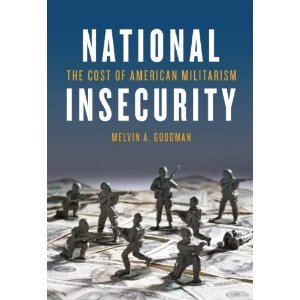
Mel Goodman
5.0 out of 5 stars Stellar Offering — Both Panoramic and Specific, February 23, 2013
First let me warn other reviewers, the new Amazon review protocol is not friendly. You have to enter a short review first, and then once that goes live, you can write a more sophisticated review with product links. I will come back and delete this once Amazon gets its act together, product links being one of the most important capabilities it offers reviewers.
– – – – –
Mel Goodman is one of a handful of scholar-practitioners writing about intelligence that actually knows what he is talking about, in detail down to the individual personality level. His earlier book Failure of Intelligence: The Decline and Fall of the CIA has been highly recommended by Retired Reader whom I consider an alter ego in terms of substance. I myself have reviewed here at Amazon over 300 books on the craft of intelligence, and almost all of those reviews, each leading back to their Amazon page, can be found by searching for the following phrase: Worth a Look: Book Reviews on Intelligence (Most).
What the author has done with this book is provide a coherent panoramic view of the politicization and militarization of intelligence (two forms of deep corruption) over the course of multiple administrations. As Retired Reader points out in his review of Goodman's earlier book, he names names and that is one of the book's features.
The core message of the book in my view is that Presidents have become hostage to the military-industrial-intelligence-congressional complex, and this is due in part to the fact that most of the people they pick for key jobs are themselves poorly read and intellectually challenged — they don't have a strategic perspective and are ineffective at challenging lies and misrepresentation from the Pentagon and its allies.
Early on I note the author's characterization of Hillary Clinton as a strategic “zero” who went along with criminally insane perpetuation of the Cheney regime's neo-conservative and extra-judicial approach to the Global War on Terror (GWOT). I have to agree with the author, and also observe that in my experience too many at the Pentagon are incapable of thinking with both intelligence and integrity at the same time. Throughout the book the author documents the incompetence of presidential advisers (so-called National Security Advisor Tom Donilon jumps to mind as the current poster boy) as well as flag officers and senior executives at the Pentagon in relation to strategic thinking — that is to say, as Sam Nunn would put it, coherent holistic thinking that connects means, ways, and ends. See also Ralph Peters' Lines of Fire: A Renegade Writes on Strategy, Intelligence, and Security [ LINES OF FIRE: A RENEGADE WRITES ON STRATEGY, INTELLIGENCE, AND SECURITY BY Peters, Ralph ( Author ) Sep-19-2011
I find the author's early discussion of covert action as a form of militarization, and his review of how this was viewed as a means of permitting reductions in defense spending in the years after Eisenhower, quite useful. He is starkly critical of the appointments of Jim Clapper as DNI and David Petraeus as Director of CIA, both representing the militarization of intelligence. Jim Clapper used to be one of my heroes and then he lost his mind and disappeared down the rabbit hole of dishonest corporate vapor-ware and “keep the money moving.” Patraeus was a political fraud — a different version of Bob Gates, skilled at political accommodation and public mis-representation of his accomplishments, and CIA was a victim of the President's need to sideline Petraeus in the run up to the 2012 election.
The author id deeply critical of Bill Clinton's choices for CIA director — Woolsey, Deutch, and Tenet — and I have to agree. The author suggests that each of them contributed to the final decline and fall of the CIA, and I have to agree. George Tenet in particular not only dismissed all of the recommendations of the Aspin-Brown Commission and the superb report that Boyd Sutton did on “The Challenge of Global Coverage” (calling for $1.5B tallied as $10M a year for each of 150 targets or topics not now covered by the secret world); but he also mis-represented CIA and prostituted himself to give a well-intentioned president a “slam dunk” endorsement of a mendacious Vice President's 935 now-documented lies justifying a war on Iraq.
The author connects the criminalization of the White House from the Reagan era to the Clinton, Bush, and now Obama eras, and one quote captures my imagination:
QUOTE (99): The pardon for Weinberger was particularly damaging because his contemporaneous notes documented “a conspiracy among the highest-ranking Reagan administration officials to lie to Congress and the American public.”
As I go more deeply into the book I am occasionally disconcerted by clear gaps in the author's understanding, no doubt because his reading and focus has been narrower than mine. He accepts as a given that the Department of State did not prepare for post-war Iraq, and he completely overlooks the tenure of General Jay Garner, who in a civilian capacity was ready to get us out of Iraq after 90 days. In fact, documented across multiple books, not only did the Department of State do an extraordinary job of preparing for post-war Iraq, they were banned from Iraq for the first year of occupation, and Dick Cheney replaced Garner with Bremer to destroy the early-out option. I cannot over-state the evil done by the nakedly amoral Dick Cheney who committed treason, in my view, on multiple occasions and in direct violation of the good intentions of the dolt that was his ostensible superior, President George Bush. Over 20 impeachable offenses by Cheney are itemized in the book and my review of the book Vice: Dick Cheney and the Hijacking of the American Presidency.
The author gives Donald Rumsfeld high marks the second time around as Secretary of Defense for making some key decisions on logistics interoperability among allies and on having big ideas for reform, and I am more than willing to accept his judgment and temper my own dismay over Rumsfeld — as with Gates and Powell — confusing loyalty with integrity and betraying the public trust by helping Dick Cheney get away with the subversion of the Constitution (good-bye Article 1) and the destruction of the Republic's economy through imperial over-reach at public expense.
QUOTE (151): The use of tailored intelligence to justify an immoral war was a direct result of the Bush administration's militarizing of the intelligence community.
The author goes on to cite the Silberman-Robb Commission finding that because of the militarization of intelligence, there was no focus on the strategic issues surrounding the elective war on Iraq and the consequences of eliminating the primary bulwark against Iran. I have reviewed 49 books tagged “Iraq” at Phi Beta Iota the Public Intelligence Blog, with each review leading back to their Amazon page. The author has missed a great deal of detail, but his narrative is coherent and righteous.
Chapter Six is the heart of the book and provides a useful chapter for assigned reading if only one chapter can be chosen. The militarization of intelligence led to a cooking of the books reminscent of Viet-Nam. I personally believe that had a series of CIA directors had greater personal integrity, this would not have been the case, but when one combines political appointees without integrity and a Pentagon without integrity, one gets a cesspool of unanticipated and unintended consequences. Two quotes:
QUOTE (231): In fact, one of President Obama's greatest failures in dealing with national security issues has been his failure to address the moral issues he inherited from the Bush administration, particularly the CIA's use of torture and abuse ….. drone warfare; assassinations and extra-judicial killings ….
Here I find the author naive. Obama-Biden are a continuation of Bush-Cheney, and one has only to look at the Attorney General and his wildly promiscuous destruction of most of the Articles in the Bill of Right, capped off by his telling the Court in writing that the Department of Justice has the right to lie to the courts in cases of national security. John Brannan is a good man out of his depth in matters of state, but the culture of the Obama White House, with Tom Donilon and John Brennan being the Monica Lewinsky and Ollie North of our time, is unabashedly imperial, immoral, and incompetent.
QUOTE (270): The CIA has become the most militarized civilian intelligence organization in Washington…
The author is completely correct here, the emphasis being on civilian — the military has always owned the imagery and signals intelligence agencies, and Dick Cheney and Bob Gates, among others, have been the primary opponents of intelligence reform in favor of keeping secret intelligence dollars under military control, and secret intelligence products skewed toward inflated threats and often imaginary threats.
The end of the book is for me the rich experience — the author is uniquely qualified for having spend 14 years at the National Defense University on top of 24 years at CIA — and he offers up very specific recommendations for cutting back the US military at a time when the incoming Secretary of Defense, probably Chuck Hagel, desperately needs a handful of people with both intelligence and integrity.
Chapter Seven is devoted to a careful articulation of the lies and other forms of professional malfeasance surrounding the Pentagon's waste of tens of billions of dollars annually on missile defense. In two words: “cut here.”
Among his other recommendations:
01 Reduce the size of the standing uniformed force and the civilian workforce by 20% (I would strive for 30% while protecting the National Guard and making the Guard releasable for war only with the advice and consent of each state's legislature).
02 Return the 300,000 military personnel serving overseas outside of Afghanistan and Iraq (and of course terminate our presence there as well as the presence of the Joint Special Operations Group (JSOG) and Special Operations Forces (SOF), two different beasts, in over 100 countries.
03 Radically reduce the number of officers (rank structure) across all of the services. Personally I believe a good start would be ordering all four star and three star general home, and then retiring all of them at their reduced earned rank. The USA has the most bloated officer corps in the world — in history — and nothing would help the incoming Secretary of Defense clean the stables faster, than the retirement of the unethical clowns that have overseen the post-Cold War porkfest.
04 Extend the retirement age of military personnel who do NOT go into combat (I would offset this with a radical increase in military mental and physical health capabilities, and use the VA hospital system as a a scalable model for a national health care system that eliminates the 50% of health dollars that are documented waste (see the excellent report, “The Price of Excess” by PriceWaterhouseCoopers).
05 Rapidly eliminate Cold War systems that do not work and are not affordable nor sustainable. Every service has its dogs. The fact is that the Joint Requirements System is dishonest, incoherent, and a complete betrayal of the public trust. Among the dogs are the Marine Corps V-22, the Army Future Combat System (FCS), every Air Force aircraft program, most Navy ship and seaborne weapons system programs; and the entirety of the DoD communications and computing system.
06 Radically reduce the nuclear arsenal.
07 Radically reduce military assistance to the 40 dictators that we favor. See Ambassador Mark Palmer's Breaking the Real Axis of Evil: How to Oust the World's Last Dictators by 2025. I favor transferring half of these funds to the Department of State to wage peace and stabilizations and reconstruction operations, but on condition that the Department of State learn how to leave the capital city and get its hands dirty — the Agency for International Development (AID) has been retarded by its integration into State, the time has come to rethink the entire global engagement infrastructure, and it may be that some form of inter-agency foreign service including Commerce is needed, especially well qualified people whose signal virtue is that they never ever go inside an Embassy.
08 Document for the public, with precision, the Congressional pork attendant to every defense program. 5% is the standard kick-back on the Hill. While I believe that defense reform can be job and revenue neutral district by district and state by state, I also believe we need to stop throwing things together so corruptly, and radically alter how we buy or build. In my view, the DoD Inspector General is toothless and — a few superb investigations not-with-standing — comatose. Certainly in my own domain, intelligence, I consider the DoD IG to be a chimera.
09 The author is kinder to the Defense Advanced Research Programs Agency (DARPA) than I would be. I agree that DARPA has much to be proud of, but like military assistance to dictators, the time has come for DARPA to shift half its budget to programs relevant to waging peace by preventing war. One area I would like to see, a dual-use area, is that of an Autonomous Internet and a serious Pentagon embrace of Open Source Everything (OSE), the only scalable means of getting to Multinational, Multiagency, Multidisciplinary, Multidomain Information-Sharing and Sense-making (M4IS2), itself the foundation for hybrid public governance and what I have called for two decades, “information peacekeeping.”
There are a number of areas that could have reinforced the author's argument if addressed, including the dual chain of command that needs to be ruthlessly destroyed, the role of the financial interests, the still extant matter of $2.3 trillion never accounted for (Rumsfeld was being grilled by Congress about this on 9/10), the emerging scandal of vast underground cities built by a mix of Pentagon and private sector “deep secrecy” networks (see for instance Underground Bases and Tunnels: What Is the Government Trying to Hide?, and the continuing outrage of not having a credible Operational Test & Evaluation (OT&E) capability that is both honest and holistic. Were the Pentagon capable of intelligence with integrity, which it is not — neither the Defense Intelligence Agency nor the Undersecretary of Defense for Intelligence meet my minimalist standards — the Stryker would never have been contracted for (too heavy, has to be broken down into TWO air lifts segments), nor would the 197 artillery system ever gotten past the laughing stage.
I have ordered a companion to this book, Daniel Wirls, Irrational Security and will review that next week-end. This book does not address the other half of our criminally insane national security complex, the Department of Homeland Security (DHS) and the Federal Bureau of Investigation (FBI), both of which appear to be working against the public interest most of the time. See for example, Disaster: Hurricane Katrina and the Failure of Homeland Security and any of the other nine books that include “Homeland Insecurity” in their title. On the FBI, see the recently released The Terror Factory: Inside the FBI's Manufactured War on Terrorism.
This book, and others like it, could not have come at a better time, but I have no expectations that Chuck Hagel will get it right — he is more likely to be an inffective repeat of William Cohen, and not a William Perry, mostly because he does not know what he does not know, and he does not understand how vital it is that he first fix intelligence support to strategy, policy, acquisition, and operations, demanding ethical evidence-based decision support for truly joint evaluations of force structure and force posture. I pray he gets it right — like my prayers for the restoration of America the Beautiful and the Constitution, I am not holding my breath waiting for results.
Below are my final two allowed links, and the titles (search for) of my defense reviews pertinent to appreciating this book by Mel Goodman.
The Pentagon Labyrinth: 10 Short Essays to Help You Through It
Defense Facts of Life: The Plans/Reality Mismatch
Worth a Look: Book Reviews on Dereliction of Duty (Defense)
Worth a Look: Book Reviews on Empire as Cancer Including Betrayal & Deceit
Worth a Look: Book Reviews on War Complex–War as a Racket
Semper Fidelis,
Robert David Steele
INFORMATION OPERATIONS: All Information, All Languages, All the Time








